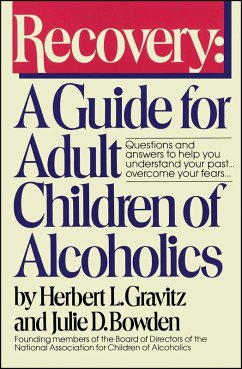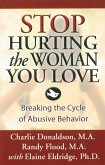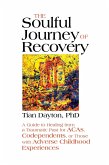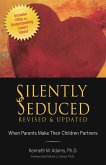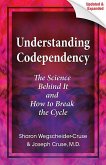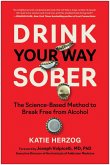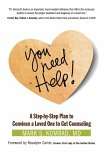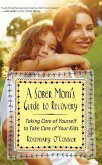

Alle Infos zum eBook verschenken

- Format: ePub
- Merkliste
- Auf die Merkliste
- Bewerten Bewerten
- Teilen
- Produkt teilen
- Produkterinnerung
- Produkterinnerung

Hier können Sie sich einloggen

Bitte loggen Sie sich zunächst in Ihr Kundenkonto ein oder registrieren Sie sich bei bücher.de, um das eBook-Abo tolino select nutzen zu können.
Rich with insight and awareness, Recovery explores the secrets, fears, hopes and issues that confront adult children of alcoholics. Authors and widely respected therapists and ACOA workshop leaders Herbert Gravitz and Julie Bowden detail in a clear question-and-answer format the challenges of control and inadequacy that ACOAs face as they struggle for recovery and understanding, stage-by-stage: Survival
* Emergent Awareness
* Core Issues
* Transformations
* Integration
* Genesis.
If you feel troubled by your post, Recovery will start you on the path of self-awareness, as it…mehr
- Geräte: eReader
- mit Kopierschutz
- eBook Hilfe
- Größe: 0.8MB
- FamilySharing(5)
![Stop Hurting the Woman You Love (eBook, ePUB) Stop Hurting the Woman You Love (eBook, ePUB)]() Charlie DonaldsonStop Hurting the Woman You Love (eBook, ePUB)13,84 €
Charlie DonaldsonStop Hurting the Woman You Love (eBook, ePUB)13,84 €![The Soulful Journey of Recovery (eBook, ePUB) The Soulful Journey of Recovery (eBook, ePUB)]() Tian DaytonThe Soulful Journey of Recovery (eBook, ePUB)11,86 €
Tian DaytonThe Soulful Journey of Recovery (eBook, ePUB)11,86 €![Silently Seduced (eBook, ePUB) Silently Seduced (eBook, ePUB)]() Kenneth M. AdamsSilently Seduced (eBook, ePUB)11,86 €
Kenneth M. AdamsSilently Seduced (eBook, ePUB)11,86 €![Understanding Codependency, Updated and Expanded (eBook, ePUB) Understanding Codependency, Updated and Expanded (eBook, ePUB)]() Joseph CruseUnderstanding Codependency, Updated and Expanded (eBook, ePUB)9,88 €
Joseph CruseUnderstanding Codependency, Updated and Expanded (eBook, ePUB)9,88 €![Drink Your Way Sober (eBook, ePUB) Drink Your Way Sober (eBook, ePUB)]() Katie HerzogDrink Your Way Sober (eBook, ePUB)13,84 €
Katie HerzogDrink Your Way Sober (eBook, ePUB)13,84 €![You Need Help! (eBook, ePUB) You Need Help! (eBook, ePUB)]() Mark S KomradYou Need Help! (eBook, ePUB)9,88 €
Mark S KomradYou Need Help! (eBook, ePUB)9,88 €![A Sober Mom's Guide to Recovery (eBook, ePUB) A Sober Mom's Guide to Recovery (eBook, ePUB)]() Rosemary O'ConnorA Sober Mom's Guide to Recovery (eBook, ePUB)9,88 €
Rosemary O'ConnorA Sober Mom's Guide to Recovery (eBook, ePUB)9,88 €-
-
-
* Emergent Awareness
* Core Issues
* Transformations
* Integration
* Genesis.
If you feel troubled by your post, Recovery will start you on the path of self-awareness, as it explores the searching questions adult children of alcoholics seek to hove answered:
* How con I overcome my need for control?
* Do all ACOAs ploy the some kind of roles in the family?
* How do I overcome my fear of intimacy?
* What is all-or-none functioning?
* How can ACOAs maintain self-confidence and awareness after recovery?
* How do ACOAs handle the family after understanding its influence?
* And many other important questions about your post, family and feelings.
Written with warmth, joy and real understanding, Recovery will inspire you to meet the challenges of the post and overcome the obstacles to your happiness.
Dieser Download kann aus rechtlichen Gründen nur mit Rechnungsadresse in A, B, BG, CZ, D, DK, EW, E, FIN, F, GR, HR, H, I, LT, L, LR, NL, PL, P, R, S, SLO, SK ausgeliefert werden.
- Produktdetails
- Verlag: Simon + Schuster LLC
- Seitenzahl: 144
- Erscheinungstermin: 29. Dezember 2015
- Englisch
- ISBN-13: 9781439147900
- Artikelnr.: 44274424
- Verlag: Simon + Schuster LLC
- Seitenzahl: 144
- Erscheinungstermin: 29. Dezember 2015
- Englisch
- ISBN-13: 9781439147900
- Artikelnr.: 44274424
- Herstellerkennzeichnung Die Herstellerinformationen sind derzeit nicht verfügbar.
Foreword
Preface
Chapter 1 Introduction
Chapter 2 Roots
1. What is an adult child of an alcoholic?
2. What is an alcoholic?
3. Why is alcoholism called a family disease?
4. What is a home like when there is an active alcoholic in the family?
5. What is a "normal" home like?
6. Does it make a difference how old I was when my parents or parent became
alcoholics or if they left home when I was a child?
7. What if both parents are alcoholic?
8. How does all this apply to me if my parents were addicted to drugs other
than alcohol?
9. Do all adult children of alcoholics feel the same?
10. Why do I feel so strange, confused and scared?
11. When did all this begin?
12. Where does this leave the children of alcoholics?
Chapter 3 Survival
13. Why are adult children of alcoholics called "survivors"?
14. I feel like I was never a kid. What happened to my childhood?
15. What happens when children are raised in a home where it is forbidden
to talk openly about what is happening in the family?
16. What are the rules that implicitly or explicitly guide an alcoholic
family?
17. What impact does this family atmosphere and these rules have upon the
children?
18. How do children adjust to this very repressive environment?
19. I have played every one of these roles. Can a person play more than one
role?
20. I am very successful and seem to have a good life; yet, I feel empty
and unhappy. What is wrong with me?
21. What needs to happen in the survival stage so that adult children of
alcoholics can begin their recovery from the effects of parental
alcoholism?
Chapter 4 Emergent Awareness
22. What is emergent awareness?
23. What happens as a result of an intervention?
24. What feelings follow coming out?
25. What are some of the pitfalls at this stage?
26. What is the best way to take care of myself at this stage?
27. What resources are needed?
28. How much can I count on other people to be helpful?
29. How do I deal with my parents at this stage (whether they are dead or
alive, near or far)?
30. Is it necessary to deal with the past and dredge up all that pain?
31. I don't remember much from my childhood. Is that common?
32. Why is it important to acknowledge the alcoholism in my family?
Chapter 5 Core Issues
33. What happens to children of alcoholics as they grow up?
34. In what ways do childhood roles and rules later work against adult
children of alcoholics?
35. What are the main problems of adult children of alcoholics?
36. What are the most common personal issues with which adult children of
alcoholics struggle?
37. What other personal issues might result?
38. In what situations are these issues most noticeable?
39. Why do I dread holidays?
40. What is the best way to take care of myself while I am confronting core
issues?
ar41. What are the pitfalls at this stage?
42. How do I deal with my parents in this stage?
43. These issues seem to apply to a lot of people. Are they really unique
to adult children of alcoholics?
44. What about the culturally different or the ethnic minority adult child
of an alcoholic?
45. How will I ever be able to get rid of all these problems?
Chapter 6 Transformations
46. What is a transformation and how does the transformations stage fit
into the recovery process?
47. How can I begin to work through what happened to me?
48. Why are issues of control and all-or-none functioning so central to
adult children of alcoholics?
49. How can I begin to come to terms with my all-or-none functioning?
50. How do I begin to come to terms with the control issue?
51. I do not fully trust anybody. I believe others are somehow going to
hurt me. What does this mean? Is something wrong with me?
52. How can I begin to work through my trust issues with others?
53. How do I begin to deal with my fear of intimacy?
54. Dealing with feelings is still scary for me. What are some guidelines
in dealing with them, especially with the new feelings?
55. Friends and family are telling me I am getting self-centered. Am I
focusing too much on myself and my past?
56. What about this notion of self-esteem?
57. How important is it for my own recovery to confront my parents at this
stage?
58. How do I know that I am working things through or that transformations
are really occurring?
Chapter 7 Integration
59. What is integration?
60. Why is integration so important for adult children of alcoholics?
61. I have been reading this book and feel frustrated and confused because
I do not seem to be feeling better. Is there something wrong with me?
62. How can I maintain my progress and growth without creating a crisis and
without sabotaging myself?
63. What are the pitfalls in this stage?
64. What are some of the most important processes in the integration stage?
65. How can I continue the process of taking better care of myself?
66. What resources are needed?
67. How can I avoid being "selfish"?
68. What kind of relationships can I expect to have with others?
69. What are my rights as an adult child of an alcoholic?
70. Is there a cure?
71. Where do I go from here?
Chapter 8 Genesis
72. What is genesis?
73. What can I do to cultivate genesis-like experiences?
74. Does genesis embrace religion?
75. Must I go through the stage of genesis? I feel like I am just getting
comfortable with everything I have been learning
76. If I experience genesis, will I finally get to be perfect?
77. What other pitfalls might occur in genesis?
78. How do I deal with my parents in this stage?
79. What now?
A Final Note From The Authors
Appendices
A. Recommended Reading
B. Where To Get More Help
References
Index
Foreword
Preface
Chapter 1 Introduction
Chapter 2 Roots
1. What is an adult child of an alcoholic?
2. What is an alcoholic?
3. Why is alcoholism called a family disease?
4. What is a home like when there is an active alcoholic in the family?
5. What is a "normal" home like?
6. Does it make a difference how old I was when my parents or parent became
alcoholics or if they left home when I was a child?
7. What if both parents are alcoholic?
8. How does all this apply to me if my parents were addicted to drugs other
than alcohol?
9. Do all adult children of alcoholics feel the same?
10. Why do I feel so strange, confused and scared?
11. When did all this begin?
12. Where does this leave the children of alcoholics?
Chapter 3 Survival
13. Why are adult children of alcoholics called "survivors"?
14. I feel like I was never a kid. What happened to my childhood?
15. What happens when children are raised in a home where it is forbidden
to talk openly about what is happening in the family?
16. What are the rules that implicitly or explicitly guide an alcoholic
family?
17. What impact does this family atmosphere and these rules have upon the
children?
18. How do children adjust to this very repressive environment?
19. I have played every one of these roles. Can a person play more than one
role?
20. I am very successful and seem to have a good life; yet, I feel empty
and unhappy. What is wrong with me?
21. What needs to happen in the survival stage so that adult children of
alcoholics can begin their recovery from the effects of parental
alcoholism?
Chapter 4 Emergent Awareness
22. What is emergent awareness?
23. What happens as a result of an intervention?
24. What feelings follow coming out?
25. What are some of the pitfalls at this stage?
26. What is the best way to take care of myself at this stage?
27. What resources are needed?
28. How much can I count on other people to be helpful?
29. How do I deal with my parents at this stage (whether they are dead or
alive, near or far)?
30. Is it necessary to deal with the past and dredge up all that pain?
31. I don't remember much from my childhood. Is that common?
32. Why is it important to acknowledge the alcoholism in my family?
Chapter 5 Core Issues
33. What happens to children of alcoholics as they grow up?
34. In what ways do childhood roles and rules later work against adult
children of alcoholics?
35. What are the main problems of adult children of alcoholics?
36. What are the most common personal issues with which adult children of
alcoholics struggle?
37. What other personal issues might result?
38. In what situations are these issues most noticeable?
39. Why do I dread holidays?
40. What is the best way to take care of myself while I am confronting core
issues?
ar41. What are the pitfalls at this stage?
42. How do I deal with my parents in this stage?
43. These issues seem to apply to a lot of people. Are they really unique
to adult children of alcoholics?
44. What about the culturally different or the ethnic minority adult child
of an alcoholic?
45. How will I ever be able to get rid of all these problems?
Chapter 6 Transformations
46. What is a transformation and how does the transformations stage fit
into the recovery process?
47. How can I begin to work through what happened to me?
48. Why are issues of control and all-or-none functioning so central to
adult children of alcoholics?
49. How can I begin to come to terms with my all-or-none functioning?
50. How do I begin to come to terms with the control issue?
51. I do not fully trust anybody. I believe others are somehow going to
hurt me. What does this mean? Is something wrong with me?
52. How can I begin to work through my trust issues with others?
53. How do I begin to deal with my fear of intimacy?
54. Dealing with feelings is still scary for me. What are some guidelines
in dealing with them, especially with the new feelings?
55. Friends and family are telling me I am getting self-centered. Am I
focusing too much on myself and my past?
56. What about this notion of self-esteem?
57. How important is it for my own recovery to confront my parents at this
stage?
58. How do I know that I am working things through or that transformations
are really occurring?
Chapter 7 Integration
59. What is integration?
60. Why is integration so important for adult children of alcoholics?
61. I have been reading this book and feel frustrated and confused because
I do not seem to be feeling better. Is there something wrong with me?
62. How can I maintain my progress and growth without creating a crisis and
without sabotaging myself?
63. What are the pitfalls in this stage?
64. What are some of the most important processes in the integration stage?
65. How can I continue the process of taking better care of myself?
66. What resources are needed?
67. How can I avoid being "selfish"?
68. What kind of relationships can I expect to have with others?
69. What are my rights as an adult child of an alcoholic?
70. Is there a cure?
71. Where do I go from here?
Chapter 8 Genesis
72. What is genesis?
73. What can I do to cultivate genesis-like experiences?
74. Does genesis embrace religion?
75. Must I go through the stage of genesis? I feel like I am just getting
comfortable with everything I have been learning
76. If I experience genesis, will I finally get to be perfect?
77. What other pitfalls might occur in genesis?
78. How do I deal with my parents in this stage?
79. What now?
A Final Note From The Authors
Appendices
A. Recommended Reading
B. Where To Get More Help
References
Index
